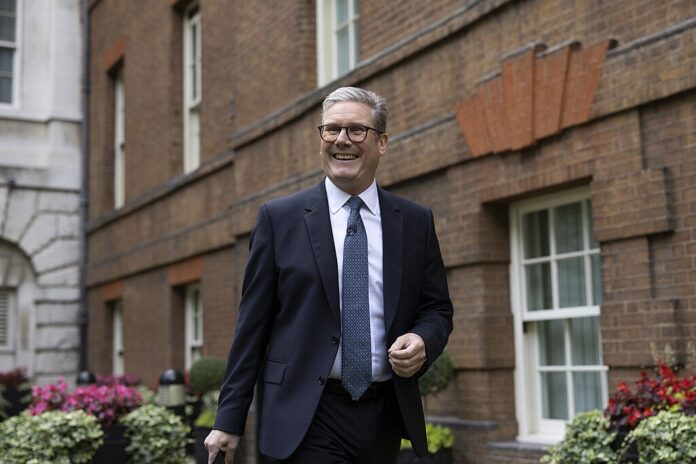Keir Starmer prepares to unveil six key milestones, but critics warn the speech may be more of an “emergency relaunch” than a genuine shift in policy
Keir Starmer is set to unveil his government’s much-anticipated “plan for change” in a speech later this week, outlining six key milestones aimed at addressing pressing domestic issues. These promises are designed to be clear, measurable targets with deadlines that will be tested by the next general election. However, as the speech approaches, political opponents are already branding it as an “emergency relaunch” rather than a groundbreaking policy shift.
The six milestones outlined by Starmer include promises to increase housebuilding and reform planning, shorten NHS waiting times for routine procedures, improve early childhood education, boost greener energy targets, and put more police on the streets in England and Wales. These targets, according to the Labour Party, will provide a framework for measurable progress that voters can hold the government accountable to.
Starmer is expected to tell the nation: “My government was elected to deliver change, and today marks the next step. People are tired of being promised the world, but short-term sticking plaster politics letting them down.” The Labour leader’s rhetoric aims to assure the public that his government is focused on long-term, tangible solutions to the UK’s most urgent problems.
Embed from Getty ImagesHowever, the speech has already drawn criticism. The Conservative Party has quickly labelled it an “emergency relaunch,” suggesting it’s an attempt to recapture momentum after a challenging start. The Liberal Democrats have similarly expressed doubts, describing the promised “milestones” as vague and unambitious. They argue that without clear plans to follow through, these promises could lead to a “road to nowhere.”
While the criticism is pointed, insiders within the Labour Party are hopeful that this speech will mark a shift beyond initial promises and give voters a clearer sense of direction. The six milestones are intended to present Starmer’s government as one that can deliver on the practical needs of the public, from housing to healthcare and policing. However, the decision to leave out immigration from the milestones has raised eyebrows. Although border and national security are expected to feature in Starmer’s speech, immigration itself will not be a priority. This omission may prove controversial, especially as immigration continues to be a divisive issue in British politics.
Starmer’s government aims to engage voters with concrete, relatable promises, similar to strategies seen in recent international elections, such as the U.S. presidential race in 2020. The focus will be on addressing how policies impact families directly, such as improving living standards and household finances, rather than making abstract, long-term promises about international relations or economic growth.
Critics have long argued that Starmer’s earlier commitments lacked the retail detail necessary to resonate with the public. While his previous “missions” outlined broad goals for government, they were often seen as too vague to be effective. In contrast, the six milestones presented in this speech are intended to be tangible and easy to understand.
Ultimately, Starmer’s success will depend on his ability to deliver on these promises. If he can meet these milestones, it could solidify his leadership ahead of the general election. But if he falls short, the public’s cynicism may grow, leaving his government vulnerable to further attacks from political opponents.
THE TELEGRAPH
In a shift from previous commitments, Prime Minister Keir Starmer has declined to reiterate his promise to make the UK economy the fastest growing in the G7. While he acknowledged the importance of economic growth, Starmer highlighted the complexities of global economic conditions and the challenges of delivering such a target, particularly in the face of ongoing uncertainties such as inflation and global supply chain disruptions. His remarks signal a more cautious approach to economic promises, as he focuses on longer-term stability rather than short-term growth benchmarks.
FINANCIAL TIMES
Prime Minister Keir Starmer is set to announce a new set of ‘mission’ targets aimed at reforming Whitehall and driving forward government efficiency. The initiative, which is expected to be unveiled in the coming weeks, seeks to establish clear, measurable goals for various sectors, including public services, infrastructure, and digital transformation. Starmer’s plan is to hold government departments accountable for achieving these targets, ensuring that resources are better utilised to tackle the UK’s long-standing challenges. This move is seen as part of his broader push for government reform and improved public service delivery.
